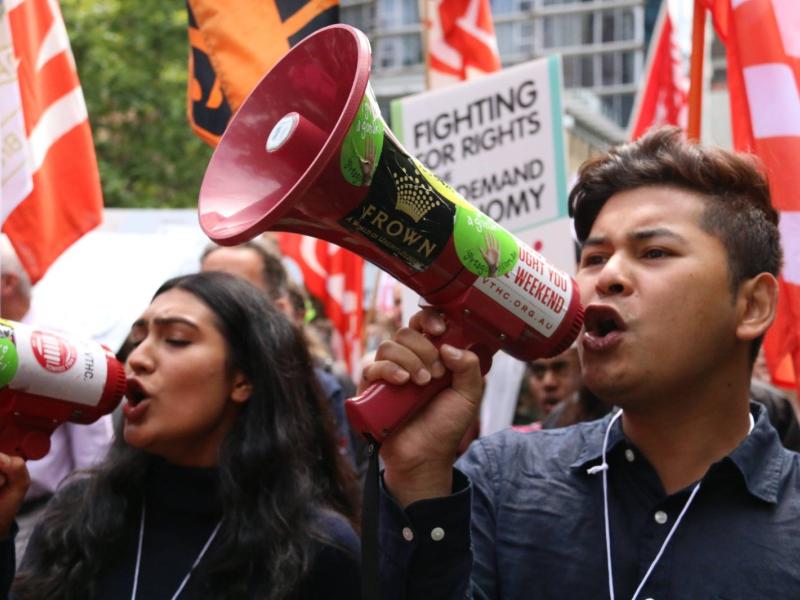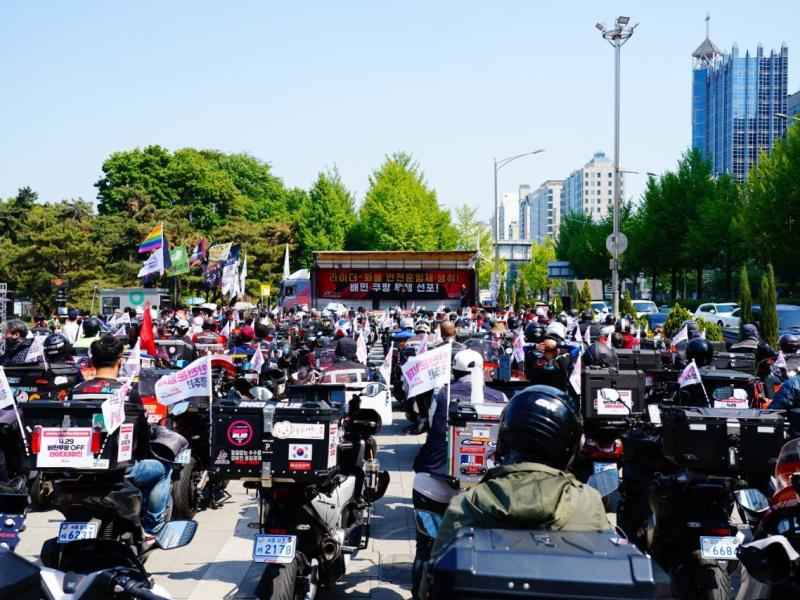Deliveroo riders are taking coordinated international action to protest the company’s plans to profit from an IPO while denying them basic rights.
On 26 March, a series of international actions will start against loss-making Deliveroo, the most protested platform company in the world, aiming to challenge the company’s treatment of its riders.
Actions are planned:
- In Australia, where there are two outstanding court cases against Deliveroo regarding unfair sacking and wage theft, riders will go on strike and hold a public protest at the iconic Sydney Opera House
- Riders in the French cities of Bordeaux, Toulouse and Lyon are organising local actions, from signing-out of their accounts for the day to leafleting riders and customers
- In Italy there will be a national day of action across all platforms, with riders across 30 cities pledging not to log-in to any delivery apps all day
- In the UK, where Deliveroo is based and intends to list on the London Stock Exchange, a self-organised group of delivery workers have called for a strike on 28 March. In addition, riders with the Independent Workers Union of Great Britain have voted to strike on the listing day, 7 April
Deliveroo’s mistreatment of workers is so notorious that Aviva, one of the UK’s biggest investors, this week cited it as the reason it would not invest in the company. UK fund manager Aberdeen Standard has also said it will avoid Deliveroo’s IPO, due in part to concerns with the company’s employment practices.
Deliveroo’s own IPO prospectus features 24 pages of identified risks, including a laundry list of legal challenges in nearly every country where the company operates. The document admits that “ongoing success in defending” its bogus model of self-employment “cannot be guaranteed.” It also notes that ongoing lawsuits relating to worker status could “affect our ability to continue operating.” This is nothing short of an admission to investors that Deliveroo’s current business model is reliant on rider exploitation.
“No one wants to work long hours, out in the elements, without basic protections like minimum wage, holiday and sick pay. Yet this is the daily reality of Deliveroo riders,” says Stephen Cotton, General Secretary of the International Transport Workers’ Federation (ITF). “Deliveroo CEO Will Shu has called riders pandemic ‘heroes’. Actions speak louder than words – he should do the right thing and grant riders the rights that all working people deserve.”
As part of Deliveroo’s IPO charm offensive, it recently announced a £16 million rider fund, featuring one-off payments to “give back” to the riders who have made its business possible. Most riders will only receive very small additional payments, however. “I’ve worked for Deliveroo for four years and in that time my pay has been slashed over and over without any ability for me to challenge the cuts,” says Marcelo Batista, a Deliveroo rider and member of the Transport Workers’ Union of Australia. “They told me I’d delivered more orders than 90% of riders but I will receive the second lowest amount in the IPO payments. The ‘bonus’ scheme is as much of a sham as Deliveroo’s business model.”
Because of their misclassification as independent contractors, Deliveroo riders have little job security. They are vulnerable to terminations without evidence or due process and have few avenues to dispute them.
Riders also point to health and safety concerns, with Deliveroo’s piece-rate payment system forcing them to work longer hours and take greater risks on the road, often for less than minimum wage. Just this week, another rider in France was killed while out on a delivery. Due to a lack of social protections from the company, his family is having to crowdfund the cost of his funeral.
The riders’ actions on 26 March come on the heels of Uber’s historic about-face following the UK Supreme Court ruling, which obliges the company to recognise the worker status of drivers and the benefits this automatically confers to workers. Meanwhile an ongoing consultation by the European Commission on the rights of gig economy workers is likely to further challenge the viability of Deliveroo’s predatory business mode.
In Ireland, following a rider death in August and strike in January, Deputy Prime Minister Leo Varadkar committed to introduce measures to address riders’ concerns.
In the Netherlands, Deliveroo will be back in court on 14 April to determine whether the collective bargaining agreement for logistics workers will apply to Deliveroo riders, as an early court decision in 2019 suggested would be appropriate. In February, Amsterdam courts ruled that Deliveroo riders are in fact employees.
The ITF is supporting the #Rights4Riders network, an international coalition of Deliveroo riders leading the 26 March actions, as part of its commitment to amplify organising by platform workers. In November, the ITF launched 10 gig economy employer principles, which provide a roadmap out of exploitation in the gig economy.
Interviews are available. To arrange, contact Dalila Mahdawi on mahdawi_dalila@itf.org.uk or media@itf.org.uk
ENDS




